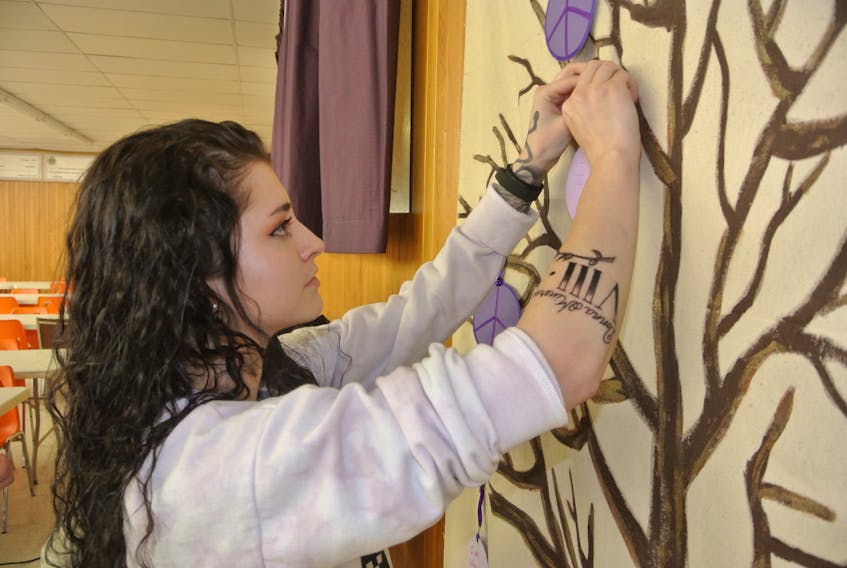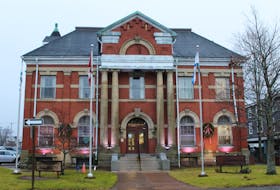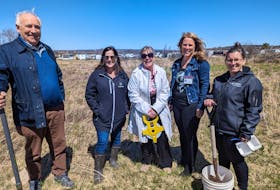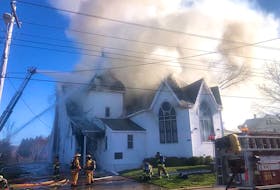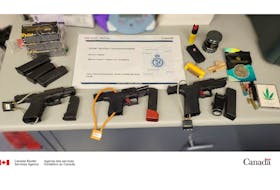AMHERST, N.S. – The debate over whether a Christmas carol is appropriate, or should be removed from radio playlists, is distracting from the real discussion that needs to take place about sexual violence and domestic assaults against girls and women in society.
Speaking to the National Day of Remembrance and Action on Violence Against Women, Rene Ross, the executive director of the Sexual Health Centre for Cumberland County, said the issue of violence against women is just as big a problem as it was in 1989 when 14 women were killed at a Montreal engineering school on Dec. 6, 1989.
“We lack common understanding of what sexual violence is and its impact, and rather than addressing the impact of the mass media we tend to fall into radical debates about Christmas carols from the 1930s,” Ross said. “We do need a cultural shift and remember the mass media has an influence, but we also need to remember that debates about Christmas carols really distract us from the issue at hand that is violence against women and girls and the normalization of this violence.”
A number of Canadian radio stations recently said they were removing the 1940s carol Baby, It’s Cold Outside from their Christmas playlists in light of the #metoo movement. The decision touched off a debate about political correctness.
Ross said one of the challenges groups which work with abused women have is the rural nature of Cumberland County and the feeling that the province ends at the toll booth. She said there’s a feeling among those who work with and advocate for victims of violence that support is much greater the closer you get to Halifax.
She said education is key to activism.
“There was a time that I thought venting was activism. It was only when I started at the sexual health centre that I realized activism at its core is education and how we react to situations is modelled by youth who look up to us,” Ross said.
The key, she said, is for increased access to inclusive services that are immediate and culturally competent. There needs to be equitable funding across the province that’s based on community needs more so than political stripes.
“We must continue our work so people understand what violence is, why it is wrong, why we must stop it and why there must be intolerance,” Ross said, adding changes works best when it comes from the bottom up. “This cultural shift must be reflected in our thoughts, our words, decisions and our actions and it must be reflected in education and our advocacy efforts.
“It’s not just about delivering services or how much funding is available, it’s about bringing people together to take ownership and challenges the assumptions and changing the attitudes on every level of our society and every community in Cumberland County.”
Amherst lawyer Stacey Merrigan said the families of the victims of the Montreal shootings have asked Canadians to broaden the discussion about violence against women to remember the missing and murdered Indigenous women in Canada, all the Canadian women who’ve been murdered and the women who’ve been silenced forever.
“There is a crisis in our country. In 2014, RCMP reported that between 1980 and 2012 1,180 Indigenous women and girls were murdered,” Merrigan said. “She said Indigenous women and girls are six times more likely than non-Indigenous women to be murdered even though they only represent four per cent of the population.”
She said in the fight against violence, women are the sword in that they speak out, act and advance the cause, while those with power and privilege – men – are the shields in that they interceded, support and protect.
“When I was preparing for today I asked myself why is it so important to remember those 14 women? I think it’s more than an expression of grief or compassion for their families. It’s a condemnation of acts of violence against women or anyone on the basis of gender. It’s an affirmation we value the lives of all people and it’s a challenge to our society to not just remember, but to act.”
Twitter: @ADNdarrell

